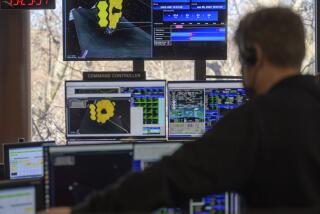Northrop Accused of Overcharging in Stealth Program
Northrop was sued in federal court on Wednesday by four current and former employees for allegedly overcharging the government by more than $2 billion on the stealth bomber program.
The suit, which is under seal in U.S. District Court in Los Angeles, alleges that Northrop overcharged the government on the program through a variety of false billings, misrepresented charges and double billings, according to Robert Kilborne, a Claremont attorney representing the employees.
As a result of the allegations, the Air Force Office of Special Investigations said it has started a parallel investigation into the allegations at Northrop’s advanced systems division in Pico Rivera and Palmdale, where the stealth work is performed. Such investigations by the Air Force are normally conducted in the event of this type of allegation.
“We just began an investigation,” said Maj. Kathleen McCollom, an investigations office official. “We are looking at the advanced systems division as a whole, which includes a number of different aspects and issues.”
Officials at the U.S. Attorney’s Office in Los Angeles are seeking classified documents from Northrop that the employees in the lawsuit claim will substantiate their allegations about the overcharges, Kilborne said. Air Force officials confirmed that the U.S. Attorney’s Office is involved in the investigation.
The lawsuit by former and current employees was brought under the False Claims Act, which enables individuals to sue on behalf of the government and share in the ultimate recovery of any funds owed the government.
The four Northrop employees and former employees bringing the suit are an internal auditor, a former controller, a former avionics engineer and a former test equipment engineer, Kilborne said.
Northrop spokesman Tony Cantafio said, “As a matter of policy, we cannot comment on the B-2 (the stealth bomber) or on every item of speculation that comes up on the program.”
First Flight Delayed
Northrop was awarded an Air Force contract in October, 1981, for development of the top-secret stealth bomber, which is intended to elude detection by enemy radar through a variety of new technologies.
The first flight of the bomber was recently delayed until August, at least eight months behind schedule, according to a number of knowledgeable sources.
The Air Force has said publicly that it plans to build 132 stealth aircraft. Some outside experts believe that the program will ultimately cost $60 billion.
Kilborne and Herbert Hafif, attorneys in the same Claremont law firm, have become regular opponents of Northrop. They are handling three false claims suits, brought by former and current former employees, involving Northrop’s work on the MX missile guidance system.
The new stealth bomber lawsuit contains 17 counts or allegations of violations under the False Claims Act, Kilborne said in an interview Wednesday. The suit was sealed--and thus could not be examined by reporters--because under federal law the Justice Department has 60 days to decide whether to join the plaintiffs.
Lack of Progress
The suit alleges that Northrop suppressed and destroyed internal audits indicating that improper contract charging had occurred on the bomber program, Kilborne said. The audits allegedly verified at least $400 million in mischarges at the division and projected that at least $1 billion in mischarges had occurred by the summer of 1987, Kilborne said. The lawsuit identified further mischarges beyond those found in the audit of at least $1 billion.
Northrop allegedly sought to conceal cost overruns and its lack of progress in the bomber program from Congress, according to Kilborne.
A key part of the allegations involves the “earned value” system, in which Northrop is periodically paid by the Air Force for the work it has completed. Kilborne said Northrop misrepresented how much work it has completed and received excessive payments under the earned value system.
In interviews with The Times, the employee plaintiffs said they observed a substantial amount of waste in the program. An engineer plaintiff said he was laid off by the company after he notified management of what he believed was time-card mischarging on contracts. He added that he was told to turn in time cards billing his work to a contract other than the one under which he was supposed to be working.
The employees requested that their identities be withheld.
More to Read
Inside the business of entertainment
The Wide Shot brings you news, analysis and insights on everything from streaming wars to production — and what it all means for the future.
You may occasionally receive promotional content from the Los Angeles Times.











